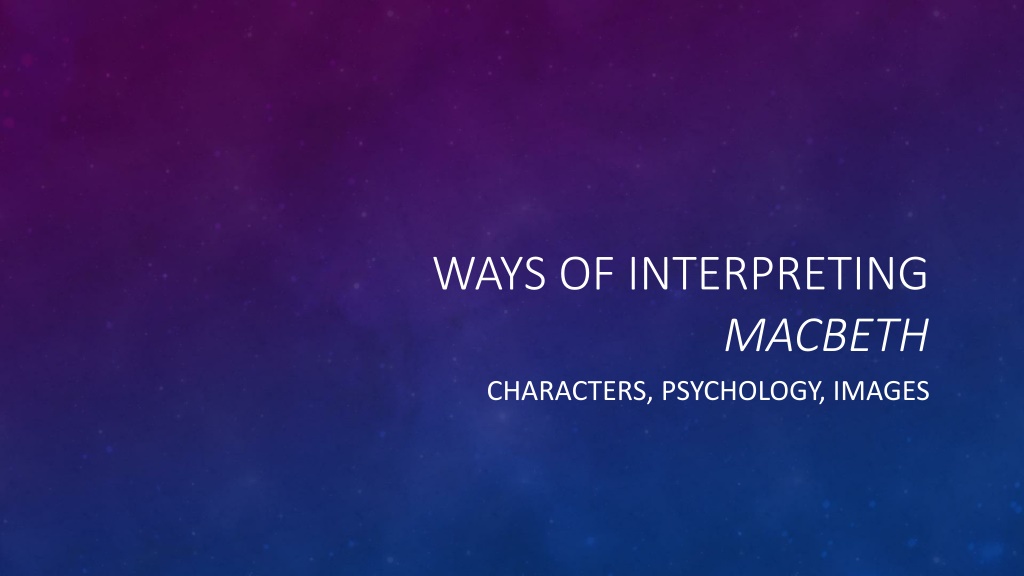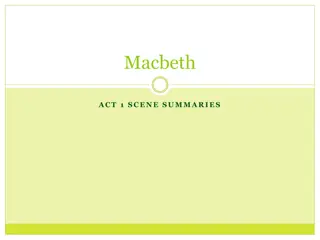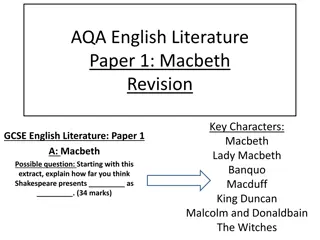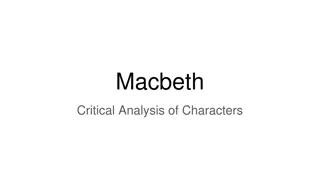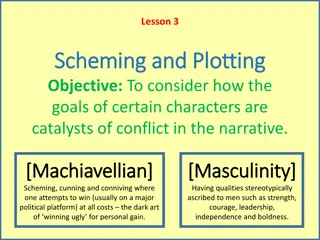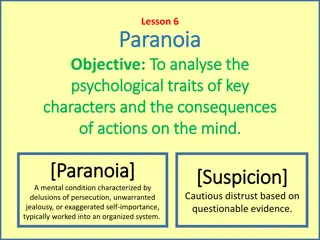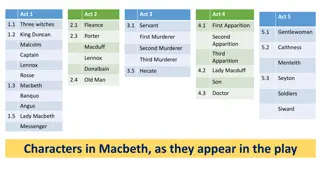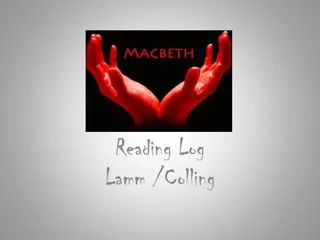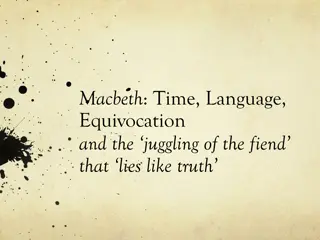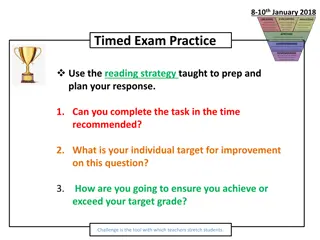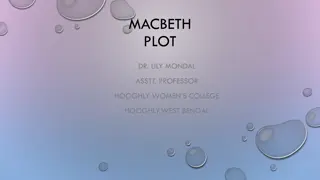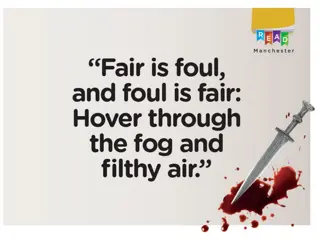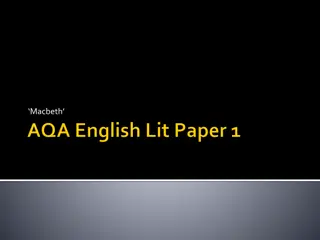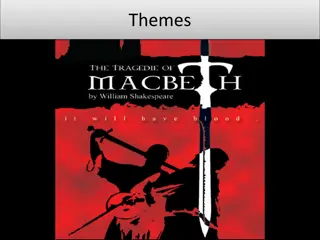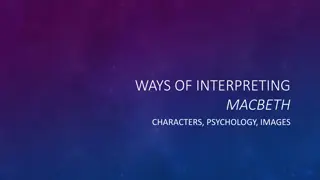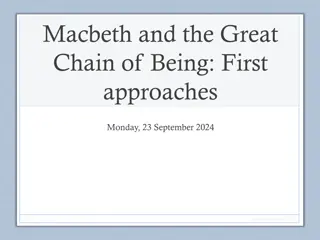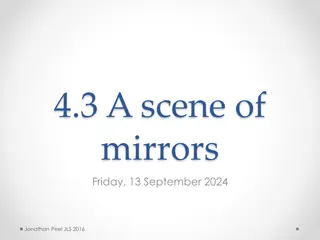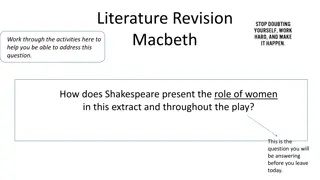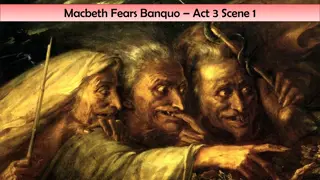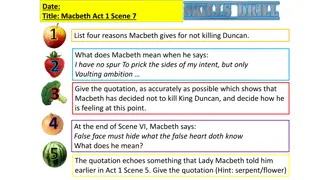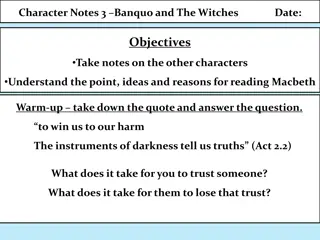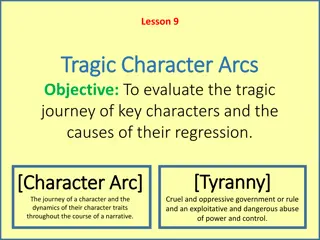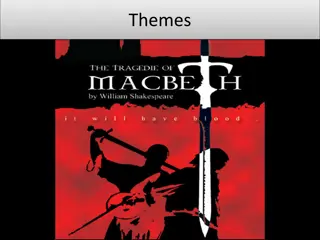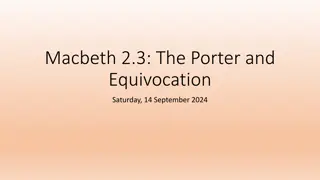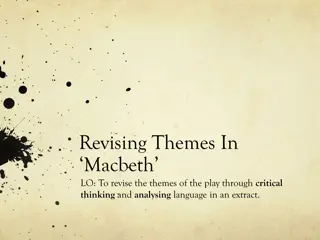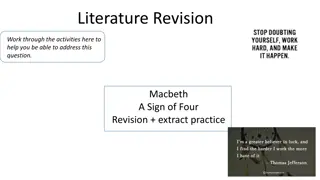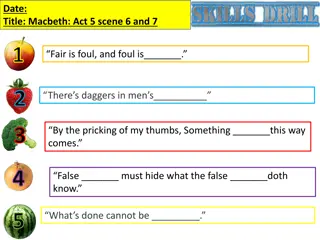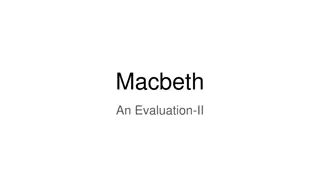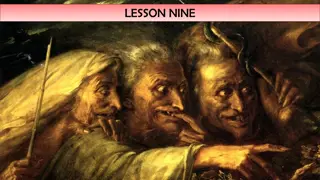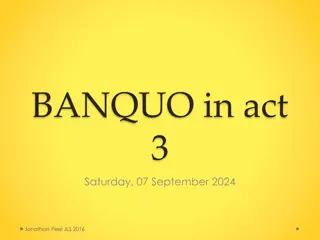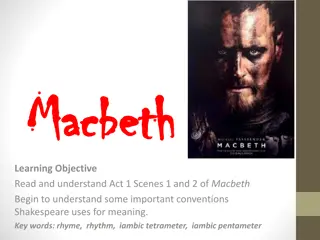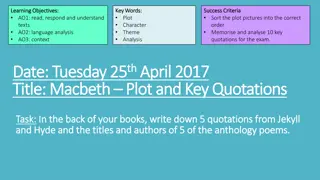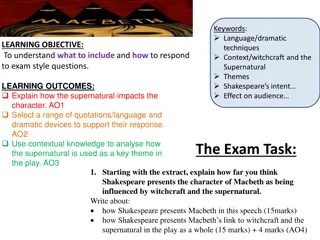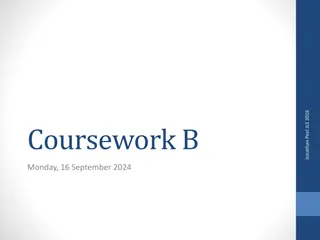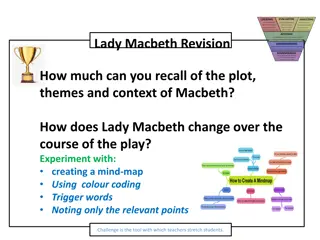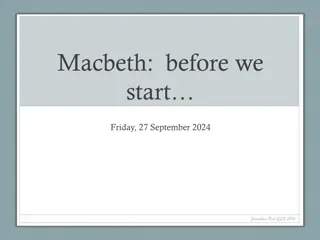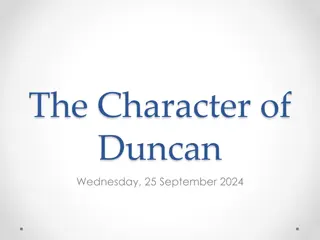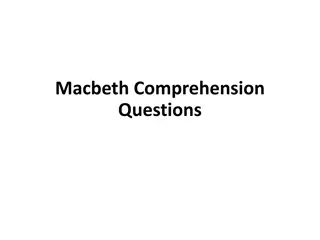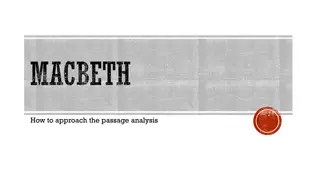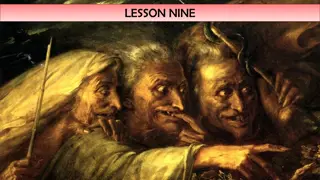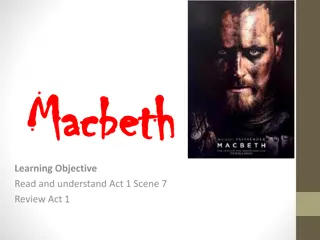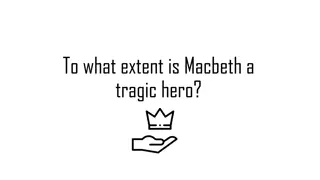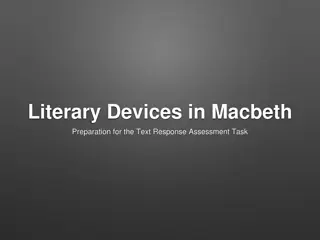Psychological Insights into Macbeth Characters and Themes
Exploring the psychological depth of Macbeth characters, this analysis delves into how the murder affects Macbeth, Lady Macbeth's chiasmic transformation, and the enigmatic nature of the Weird Sisters, offering a rich interpretation of their actions and motivations throughout the play.
Download Presentation

Please find below an Image/Link to download the presentation.
The content on the website is provided AS IS for your information and personal use only. It may not be sold, licensed, or shared on other websites without obtaining consent from the author. Download presentation by click this link. If you encounter any issues during the download, it is possible that the publisher has removed the file from their server.
E N D
Presentation Transcript
WAYS OF INTERPRETING MACBETH CHARACTERS, PSYCHOLOGY, IMAGES
WHAT THE MURDER DOES TO MACBETH He moves from sensitivity to insensitivity. Starts paralyzed with interior agony and moral doubt. ends where he feels nothing at all, but just keeps doing what he must like a bear chained to a stake. They have tied me to a stake. I cannot fly./ But bear-like I must fight the course. (5.7.1-2) As a tragic figure, he experiences a kind of stripping, divestment. Of honor, of speech, of agency. He doesn t even want to tell his story at the end because life is a tale told by an idiot, full of sound and fury, signifying nothing. (5.5.29-31)
LADY MACBETH: THE INVERSE OF HUBBY (A CHIASTIC STRUCTURE) She starts by claiming total insensitivity and ends in tortured sensitivity Unsex me here, taking Macbeth s daggers to mark the guards with blood and draw suspicion to them, Tormented: out, dammed spot! washing her hands endlessly for days without sleep and finally suicide. Like Macbeth, She is silenced, but before she goes, she talks obsessively What s Shakespeare doing here? Why this mirror movement? What s he trying to say about the ruthless drive to power?
WEIRD SISTERS & WEIRD SISTERS & PSYCHOLOGY PSYCHOLOGY The play is about transgression, unleased powers that cross into the world of the stage. That s what the weird sisters represent They are called weird sisters by everyone in the play, not witches except once in an anonymous reported incident, and the sister in question is insulted. The world wyrd is Old English for fate. The fates of Greek mythology spin, apportion and cut the thread of each human s life. King James wrote a book on witchcraft called Daemonology. The play was performed for him probably at his request. Witches were part of folk culture of superstition and mysterious powers, regionally distinct (Scottish & Celtic & Welsh are all different). But Shakespeare uses the witches to represent a state of mind, not to explore the occult. I don t think he s really interested, since he didn t do a minute of research about it
THE WEIRD SISTERS (CONTINUED) Their landscape is a wasteland, windswept, empty, unfruitful, uninhabited, inhuman & symbolic Do they cause anything? Banquo hears that his sons will be kings, but that doesn t make him kill the king to fulfill the prophesey. The sisters tell Macbeth what he has already been thinking. Macbeth can t understand the final prophesy because it doesn t fit his ambition: armed head (Macbeth s bloody head, which will be cut off by Macduff and set on a stake) bloody child (Madcuff untimely ripped from his mother s womb), the child crowned, with a tree in his hand (Malcom, Duncan s elder son, who tells the soldiers to carry branches and bring Birnam Wood to Dunsimere)
WEIRD SISTERSCRITIQUE OF CLASS? They are unmarried women, clearly marginalized They complain about poor treatment called a witch, excluded socially They seek power through manipulation since they can t get it other ways A more intense and unconscious expression of the fear of unmarried women (Elizabeth) and women s power generally? Personally, I think the psychological angle is stronger, but they are located socially, so not irrelevant.
IMPORTANT IMPORTANT IMAGES 1: IMAGES 1:DOUBLES Doubles and equivocation: Macbeth is split: fear and ambition, guilt and numbness The opening description of him in battle: As two spent swimmers that do cling together/ and choke their art. . . . There are 2 Macbeths and they will kill each other He is trusted yet betrays Duncan Macbeth kills Macduff (who is no threat) to be double sure Also two kinds of blood: blood line, the succession of heirs the blood spilled in the play through murder and war, the blood on one s hands.
IMPORTANT IMPORTANT IMAGES 2: IMAGES 2: HARVEST AND FRUITFULNESS Everyone but Macbeth can talk of home and hearth and harvest. Duncan speaks of his plenteous joys,/ Wanton in fullness. We hear constantly about the seed of Banquo that will rule for generations (Banquo was King James ancestor). When Macbeth murders Duncan, images of fruitfulness go away and Nature becomes Unnatural horses eat each other, nature turns against itself The witches tell Macbeth he can only be killed by a man not born of woman when the wood comes to Dunsinane both unnatural (and presumed impossible).
IMPORTANT IMAGES 3: DRESS Macbeth starts with clothing that fits him, but over the course of the play his clothing becomes more and more grotesque. I.3.106-107 he is dressed in borrowed robes. 1.3.143-145 Banquo says New honours come upon him,/ Like our strange garments, cleave not to their mould/ But with the aid of use. His wife mocks him: Was the hope drunk/ Wherein you dressed yourself? (1.7.31-36) And finally, Now does he feel his title/ Hang loose about him, like a giant s robe/ Upon a dwarfish thief. (5.2.15-16) Thus his clothing reveals that the play is not about whether he will do the deed, but what the deed will do to him.
GROUPS: ASSIGN A NOTE-TAKER, SPEAKER AND FACILITATOR 1. Why this mirror movement of Macbeth & his wife? What s he trying to say about the ruthless drive to power? (Or is it about some other issue?) 2. What do the Weird sisters unleash in the play? What part of the catastrophe theirs and what part belongs to Macbeth? 3. How are doubles important in the play? What do they symbolize? 4. Why and when does nature become unnatural in the play? 5. How does Macbeth s clothing stand for his changes in status/condition?
